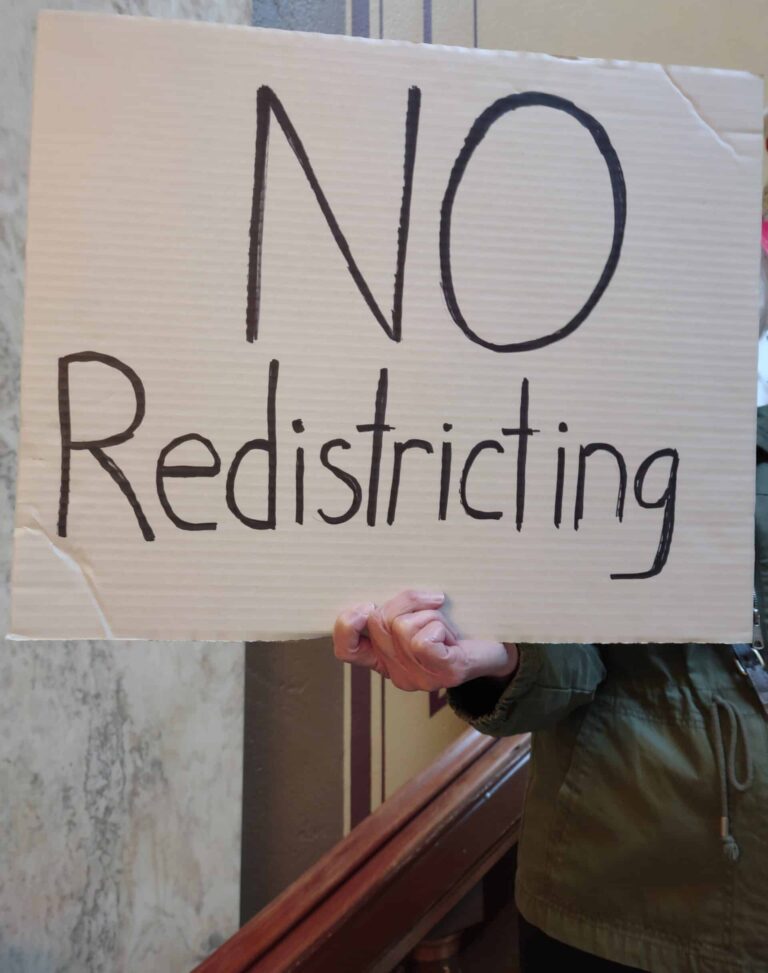
By Marilyn Odendahl
The Indiana Citizen
November 14, 2025
On Friday afternoon, Indiana Senate President Pro Tempore Rodric Bray released a two-sentence announcement that seemed to answer the redistricting question that has been swirling around the Statehouse since August.
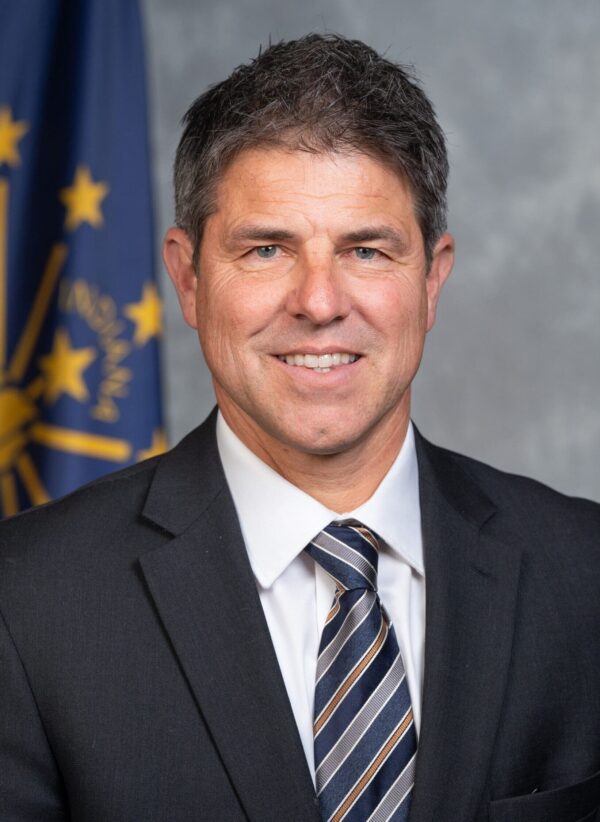
“Over the last several months, Senate Republicans have given very serious and thoughtful consideration to the concept of redrawing our state’s congressional maps,” Bray, R-Martinsville, said. “Today, I’m announcing there are not enough votes to move that idea forward, and the Senate will not reconvene in December.”
The Indiana General Assembly has been under increasing pressure from the Trump administration this summer and fall to redraw the state’s congressional districts mid-decade in order to give Republican candidates an advantage in winning all nine of Indiana’s seats in the U.S. House in the 2026 mid-term election. Vice President JD Vance visited the Statehouse twice and state Republican lawmakers were invited to the White House to discuss redistricting, but the GOP legislators had not overwhelmingly embraced the idea.
Even when Gov. Mike Braun, a Republican, called for a special session to start on Nov. 3, Bray and House Speaker Todd Huston, R-Fishers, did not respond until days later. The legislative leaders then countered by saying that the General Assembly would not meet in a special session but would instead convene for an early session from Dec. 1-12.
Huston did not issue any statement Friday, either reacting to Bray’s announcement or clarifying whether the House would be reconvening at the start of December. However, Braun issued a strong response, calling on the state senators to “show up” on Dec. 1.
While questions remain about what will happen next, voter-rights advocacy groups, who had mounted a loud and persistent campaign against mid-decade redistricting, declared victory.
“We are grateful that Senate leaders listened to Hoosiers and closed the door on mid-decade redistricting,” Megan Robertson, executive director of Indiana Conservation Voters said in a statement. “Families across our state have been clear: they want leaders focused on the real challenges they’re facing every day, not partisan power plays. With this distraction behind us, we’re eager to get back to the work that truly matters: making life more affordable, healthier and more secure for families across Indiana.”
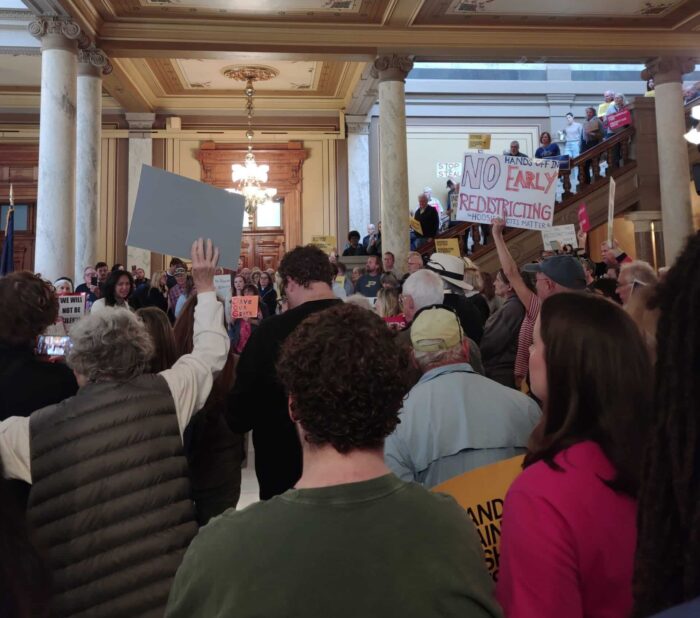
Laura Merrifield Wilson, associate professor of political science at the University of Indianapolis, called the Indiana Senate’s rejection of redistricting “incredibly significant.” She noted the State Senate had become the focus of the redistricting fight, after several Republican lawmakers publicly stated their opposition to redrawing the congressional maps. So Bray, she said, may be trying to reduce some of the heat on his GOP colleagues that could come during next year’s election.
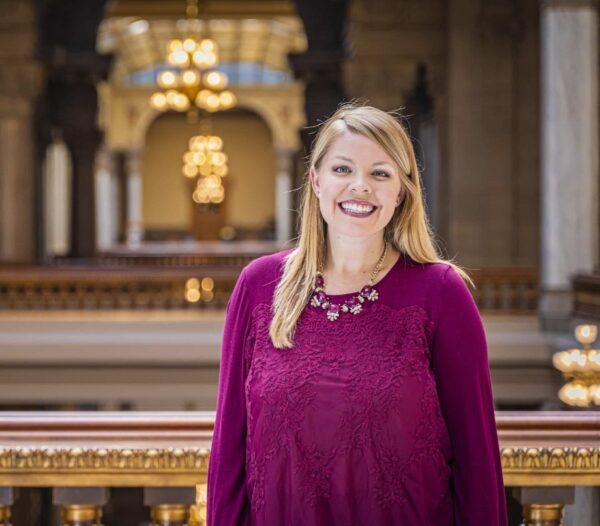
“I think, in a way, this might be a small sacrifice, a risk Bray may feel he had to take,” Merrifield Wilson said of the decision not to reconvene the Indiana Senate early. “It is saving his colleagues. For some of those where this would have been a decision that yielded a primary challenger, (a vote on redistricting) could have changed the course of their careers. Re-election is job security for these state legislators.”
Merrifield Wilson noted the GOP senators could still face a challenger in the May primary and outside groups, such as Club for Growth and Fair Maps Indiana, have been threatening to use their money to unseat Republicans who did not support the redistricting effort. However, she said, the window to recruit a challenger and mount a primary campaign is closing quickly since candidates have to file by February and the primary election is the first Tuesday in May.
“Not having to go on the record, not having to vote on this … in a formalized setting, probably protects some of the more vulnerable members of the State Senate, not necessary from a challenger, which they may expect to see, but from some of the other repercussions that they would otherwise be exposed to,” Merrifield Wilson said.
Those other repercussions might have included getting hammered by state Democrats on cost-of-living issues. At town halls, news conferences, and rallies against redistricting, the minority party had consistently made the argument that Republican lawmakers were focused on cheating and “rigging the maps,” instead of addressing the daily needs of Hoosiers who are trying to stretch their dollars to cover the basic necessities.
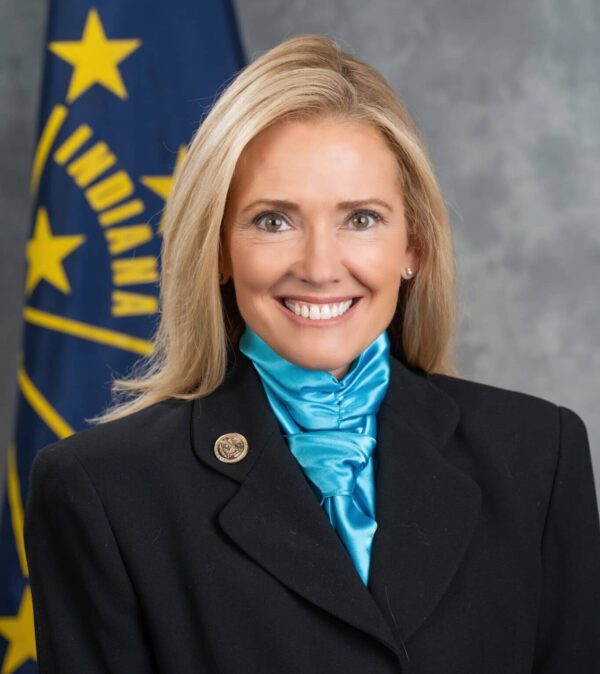
“This should have never been considered,” Senate Minority Leader Shelli Yoder, D-Bloomington, said in a statement. “Not for one day. Not for one dollar. Not while families across our state are struggling to afford groceries, child care, health care and energy bills. Now that this reckless idea has collapsed, our focus can return to where it should have been all along. Hoosiers. Their budgets. Their safety. Their health. Their future.”
Common Cause Indiana nodded to the pressure Republican lawmakers had been under and expressed appreciation for the decision to forgo redistricting ahead of the mid-term election.
“Despite the threats and bullying coming from out-of-state interests, state senators are listening to the Hoosiers they represent by rejecting mid-decade redistricting,” Julia Vaughn, executive director of Common Cause Indiana, said in a statement. “Thank you to our senators for standing up for Hoosiers and for doing what is right.”
Democrats and voting-rights advocates in Indiana consistently framed the recent push for mid-decade redistricting as “cheating,” since the legislature’s Republican supermajority had already redrawn the congressional and state maps in 2021, after the most-recent U.S. Census. Opponents also said redistricting, at this time, risked disenfranchising Hoosiers who weren’t Republicans and also would have hurt minority voters.
Throughout the redistricting debate, Braun has refrained from pushing or bullying the General Assembly into taking action. He told WOWO radio in September that he wanted to make sure that a mid-cycle redistricting was not forced upon the legislature.
However, the governor showed some anger on Friday.
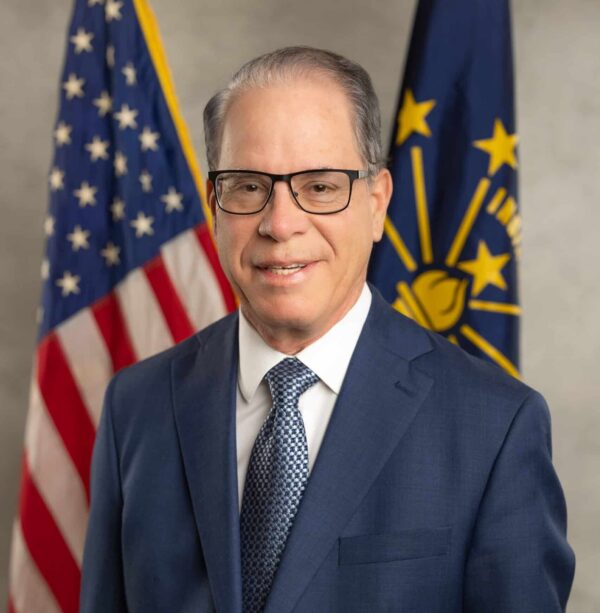
“I called for our legislators to convene to ensure Hoosiers’ voices in Washington, D.C., are not diluted by the democrats’ gerrymandering,” Braun said in a statement. “Our state senators need to do the right thing and show up to vote for fair maps. Hoosiers deserve to know where their elected officials stand on important issues.”
Lt. Gov. Micah Beckwith echoed Braun in a rare alignment of their messages. Previously, the lieutenant governor has been much more outspoken and combative in his support for mid-decade redistricting.
“I fully support the Governor,” Beckwith said on the social-media site X. “We should speak up – not stand by and let our voices continue to be watered down. Our state senators owe it to the people of Indiana to show up for the job they were elected to do. Indiana voters deserve to know where their senators stand; this must be a public vote! No more secret meetings Rod Bray.”
Merrifield Wilson said the Senate’s rejection of redistricting does hurt Braun. She pointed out the governor had started pressuring the legislature by calling for the special session shortly after Bray’s office announced in mid-October that the Senate Republican caucus did not have the 26 votes needed to pass a new map.
Now, Braun has little power in this situation, she said, since a governor can only call a special session but cannot make the legislators convene or mandate the issues they actually tackle. So, Braun, she said, is employing an “outsider strategy,” by making a public statement that all Hoosiers can hear, rather than talking to Bray privately.
“I think it does undermine some of his success that he’s had and certainly this was something I think the governor wanted to deliver for (President Donald Trump),” Merrifield Wilson said. “They’ve been allies. Braun fashions himself as a version of Donald Trump as a candidate, so I do think this undercuts that quite a bit.”
Still, a majority of Hoosiers were not receptive to Braun’s push for redistricting. A poll issued in October by Independent Indiana, a nonpartisan initiative to promote politically independent candidates for elected office, found 53% of voters in the state opposed redrawing the congressional districts this year. Also, in a statement released Friday, ReCenter Indiana, Inc., a civic-engagement organization, said public sentiment was not supportive of reconfiguring the map.
“ReCenter Indiana Inc. reminds elected officials that their responsibility is to represent and serve the people of Indiana,” Don Knebel, president of ReCenter, said in a statement. “Our organization recently hosted three nonpartisan listening sessions to share off-cycle redistricting information and allow Hoosiers to voice their perspectives. Across every community, neighbors were overwhelmingly opposed to redistricting and instead urged lawmakers to focus on the issues that matter most: lowering healthcare costs, addressing food insecurity, strengthening public schools, and protecting Indiana’s environment. We commend the Indiana Senate for prioritizing the voices of Hoosiers, and we thank the people across the state who stood up and spoke out.”
Merrifield Wilson noted that while Braun may be bruised from this fight and have some hard feelings toward lawmakers, he should still be able to make headway with the other items on his agenda. Gubernatorial reputations can be repaired, she said, pointing out that other Indiana governors, like Eric Holcomb and Mike Pence, have had acrimonious relationships with the General Assembly, but got things accomplished.
Also, she said, a diversity of opinions is good for a democracy. Conflict can serve Hoosiers by preventing governors and legislators from rubber-stamping each other’s proposals.
“I think in this case, it’s going to add some tension there,” Merrifield Wilson said of Braun’s apparent redistricting loss. “It’s going to make things a little bit more difficult, but at the end of the day, part of the separation of powers, and checks and balances, is just that the Senate can do what it has the purview to do and the governor can do what he has to do.”
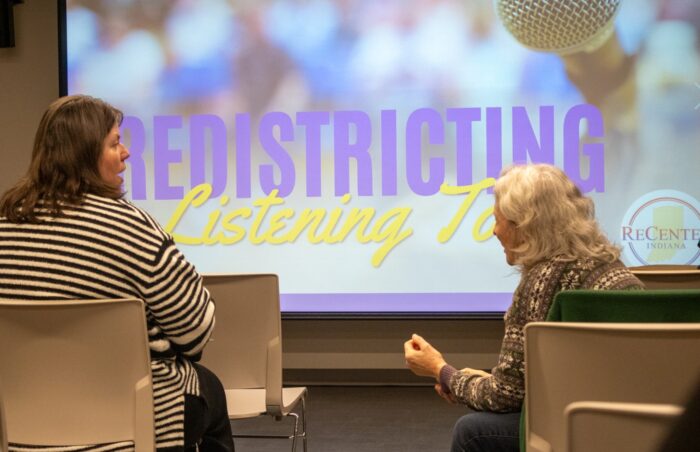
The Indiana General Assembly will convene on Tuesday for Organization Day, which is the traditional start to the upcoming legislative session.
Republicans have not said what their legislative initiatives will be for the 2026 session, but Democrats have stated they intend to continue pressing the same issues they spotlighted when they talked about redistricting.
“Now that the topic of redistricting is behind us, I look forward to working on bringing down the cost of living for Hoosiers during the upcoming legislative session,” House Minority Leader Phil GiaQuinta, D-Fort Wayne, said in a statement.
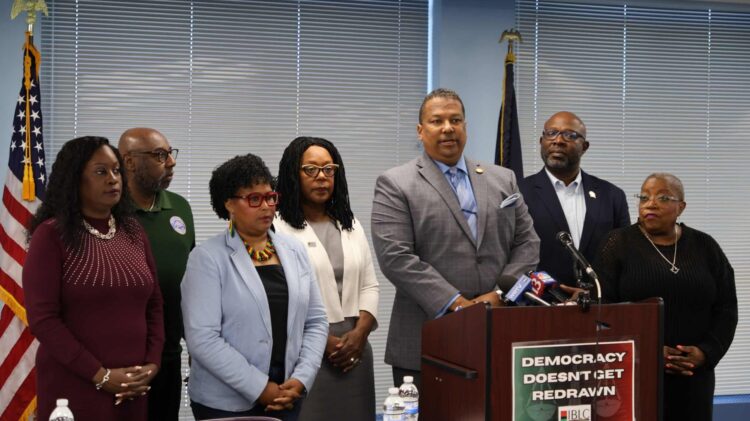
The Indiana Black Legislative Caucus, which had raised concerns that attempts to redraw the state’s congressional districts would disenfranchise minority voters, responded to Bray’s announcement by immediately canceling a public information session on mid-decade redistricting that had been scheduled for Sunday in Highland. IBLC leader Rep. Earl Harris Jr., D-East Chicago, then released a statement, pivoting to the legislative session.
“We in the IBLC are looking forward to focusing our efforts on our 2026 legislative agenda,” Harris said, “which will focus on lowering the cost of living and giving every Hoosier a fair shot at economic security.”
Indiana Citizen reporter Sydney Byerly contributed to this story.
Dwight Adams, an editor and writer based in Indianapolis, edited this article. He is a former content editor, copy editor and digital producer at The Indianapolis Star and IndyStar.com, and worked as a planner for other newspapers, including the Louisville Courier Journal.
The Indiana Citizen is a nonpartisan, nonprofit platform dedicated to increasing the number of informed and engaged Hoosier citizens. We are operated by the Indiana Citizen Education Foundation, Inc., a 501(c)(3) public charity. For questions about the story, contact Marilyn Odendahl at marilyn.odendahl@indianacitizen.org.